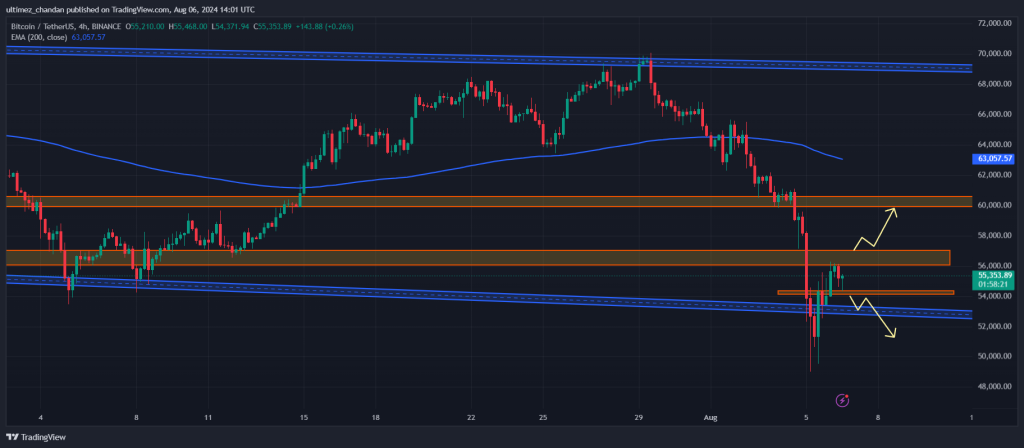Lawmakers Push to Ban Betting on 2024 Presidential Election
Several U.S. Senators and House representatives are urging the Commodity Futures Trading Commission (CFTC) to ban betting on the 2024 presidential election due to concerns about influence on outcomes. Meanwhile, in Arizona's 3rd Congressional District, a Democratic primary race between Yassamin Ansari and Raquel Terán is extremely close, and is shedding some light on the influence of crypto-focused interest groups. Additionally, a new bill introduced by Senators Catherine Cortez Masto and Charles Grassley aims to expand the Secret Service's powers to fight crypto-related crime. Furthermore, the U.S. government recently transferred 300 ETH, valued at approximately $699,000, after Ethereum faced serious selling pressure and price drops.
Senators Urge CFTC to Ban Election Betting
To try and preserve the integrity of U.S. elections, five U.S. Senators and three House representatives have urged the Commodity Futures Trading Commission (CFTC) to ban betting on the 2024 presidential election. In an Aug. 5 letter addressed to CFTC Chair Rostin Benham, the lawmakers shared their concerns that these betting markets could influence election outcomes and erode public trust in the democratic process.
Screenshot of the letter sent to CFTC Chair Rostin Benham
They also pointed out some of the potential risks of allowing wealthy people to place large bets while contributing to specific candidates or parties, as well as political insiders using non-public information to gamble on election results. The letter also placed emphasis on how important it is to finalize and implement rules to prevent the commodification of U.S. elections.
According to the politicians, elections should not be treated as a for-profit enterprise, as it could undermine their sanctity. The signatories included Senators Jeff Merkley, Richard Blumenthal, Chris Van Hollen, Elizabeth Warren, Sheldon Whitehouse, and Representatives Jamie Raskin, John Sarbanes, and Eleanor Holmes Norton, all of whom are Democrats.
The call for action comes right as decentralized prediction platform Polymarket has seen a huge amount of betting activity. In fact, bets worth over $500 million have been placed on the ”Presidential Election Winner 2024” market and $319.7 million on the ”Democratic Nominee 2024” market.
Polymarket allows global participation, but previously settled a $1.4 million fine with the CFTC in January of 2022 for operating unregistered event-based binary option markets. So far, crypto betting platforms have predominantly favored Republican candidate Donald Trump, though Democratic candidate Kamala Harris has been gaining some traction over the past few weeks.
Crypto Influence in Tight Arizona Race
The Democratic primary in Arizona’s 3rd Congressional District could hinge on a single vote after more than a week of ballot counting. On Aug. 5, Yassamin Ansari led Raquel Terán by just 67 votes, with 99% of ballots counted, according to the Associated Press.
Ansari is supported by the Protect Progress Super PAC, which spent more than $1.3 million on her campaign. Hundreds of ballots still have to be tabulated before a winner can be declared for the July 30 primary, but the very narrow margin suggests a recount is likely, as Arizona law mandates a recount for victories within 0.5% of the total votes cast.
Arizona’s 3rd District Democratic Primary vote distribution (Source: Washington Post)
Terán initially trailed by a few percentage points, and acknowledged that the race was “too close to call” on the same day. Both candidates have previously expressed pro-crypto views. Ansari advocates for leadership in blockchain and crypto innovation, while Terán supports collaborative approaches to the same.
The Protect Progress PAC also supported Republican Blake Masters with a $600,000 media buy, although he lost his primary in Arizona’s 8th Congressional District. In another race, Democrat Andrei Cherny, supported by Protect Progress, lost to Amish Shah in the 1st Congressional District. Shah opposed a bill to clarify crypto income tax issues.
The Arizona primary race is a very good example of the potential influence of crypto-focused interest groups in elections. California Representative Linda Sánchez criticized Protect Progress’ support for Ansari, and suggested it aimed to “buy a seat in Congress” and silence certain voters.
The Fairshake PAC, which is affiliated with Protect Progress, has been very active in funding ads for and against candidates in multiple states, supporting pro-crypto candidates or opposing anti-crypto ones. Protect Progress spent about $3.7 million supporting Democratic candidates in Alabama and Texas primaries in April.
In July, Fairshake raised over $202 million, though some contributions may have been counted twice. The Super PAC has also funded media buys opposing candidates in Missouri’s primaries set for Aug. 6.
Secret Service to Combat Crypto Fraud
Crypto and politics once again came face to face after two U.S. Senators, Catherine Cortez Masto of Nevada and Charles Grassley of Iowa, introduced the ”Combatting Money Laundering in Cyber Crime Act of 2024” on Aug. 2. This bill will expand the Secret Service's powers to combat cryptocurrency-related crime, specifically targeting unlicensed money transmitting businesses and potential fraud against U.S. financial institutions.
Cortez Masto believes the bill is crucial when it comes to addressing the threat posed by criminal activity funded through digital assets, while Grassley believes there is a need for stronger threat assessments to catch money laundering schemes. Overall, the bill seeks to enhance federal law enforcement's ability to anticipate and prevent financial crimes.
In 2023, illicit addresses laundered $22.2 billion worth of cryptocurrencies, which was a decrease from the $31.5 billion in 2022, according to blockchain forensics firm Chainalysis. Despite the decline, cash still is the primary method for money laundering in the U.S., which was pointed out by the Treasury Department in February. However, various federal agencies, including the Treasury, Department of Justice, SEC, and CFTC, have taken measures to fight crypto crime in recent years.
Total crypto laundered by year (Source: Chainalysis)
The Secret Service, which is more well known for protecting high-profile political figures, also investigates crimes against the U.S. financial infrastructure. On the other hand, its effectiveness was questioned in July after a failed assassination attempt on Donald Trump.
US Government Wallet Moves 300 ETH
According to Arkham Intelligence, a wallet believed to be controlled by the U.S. government transferred 300 Ethereum (ETH), that is valued at close to $699,000, to a wallet address ending in “d46” on Aug. 5. The on-chain analytics firm claimed the funds were from a government seizure. This transfer happened after a period of disappointing price action for Ethereum, coinciding with the launch of Ethereum exchange-traded funds (ETFs) in the U.S.
Independent analyst Crypto Lion attributed ETH’s poor performance to a lack of demand for the asset on exchanges. This lack of demand is taking place right in the middle of a broader financial market downturn, which is exacerbated by an interest rate increase from the Bank of Japan, that further pressured Ethereum’s price.
Major selling pressure from market makers, who unloaded about 130,000 ETH valued at $290 million, caused ETH’s price to drop to lows of around $2,100 on Aug. 5.
ETH 7D price chart (Source: CoinMarketCap)
The CoinShares weekly inflows report from Aug. 5 indicated that digital asset investment vehicles experienced their first capital outflow in four weeks, with Ethereum investment funds and products seeing outflows totaling $146 million for the week. Since the launch of the Ethereum ETF in the U.S., total outflows have reached $430 million.
CoinShares analyst James Butterfill suggested that the market downturn is driven by macroeconomic factors and geopolitical tensions, which could indicate a potentially longer recovery period for ETH than initially expected.




